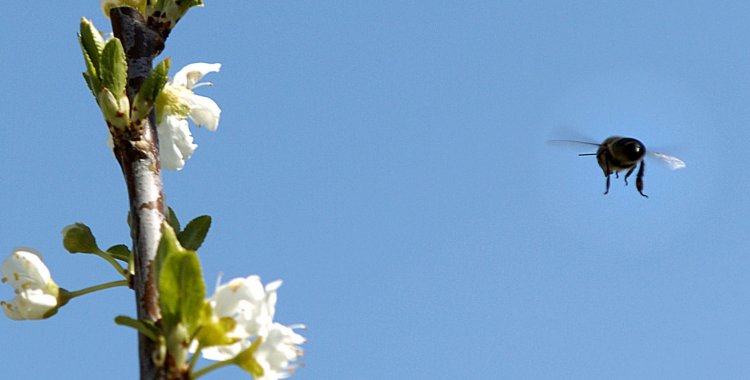The Ministry of Agriculture and Fisheries denies, however, that the lack of honey is related to the indiscriminate killing of honey species, attributing the factor to other phenomena, including drought.
In a statement to Lusa, the president of the Angolan Beekeepers' Association, Frederico Maurício, confirmed denunciations spread through social networks and that they report the scarcity of honey in Moxico province, where, even after the prohibition of logging, Chinese citizens continued their activity illegally, using insecticides to kill bees.
Frederico Maurício mentioned that, last year, a commission was created in Moxico to investigate the situation with the government of that province and some measures were taken, and the association is following up the issue.
"We found out that this information was true, the indiscriminate slaughter of honey species, one of them 'mussivi', which was the same species that competed between beekeepers and loggers, and as the bees during the conflict attacked the Chinese, they used insecticides to kill everything," he said.
Frederico Mauricio confirmed the accusations received in 2019, but stressed that he has not yet been able to confirm those of this year, due to the restrictions of circulation imposed by the government because of the covid-19 pandemic, so it has not yet been possible to verify "whether the situation is prevailing this year or not".
"There was evidence of this kind of mass extermination of bees. This year, we have the situation of the pandemic, nobody goes and nobody comes, we have the information that the situation tends to improve in some areas", said the association leader.
According to the president of the Association of Beekeepers of Angola, after last year's denunciations, the authorities have taken measures, among which the decrease in the number of logging licenses in the region.
The director general of the Forest Development Institute (IDF), Simão Zau, considers, however, that associating the scarcity of honey to tree felling has no basis.
According to Simão Zau, when they learnt the reports, a team of technicians went to Moxico and worked in collaboration with the local authorities to investigate the causes of the honey production decrease, stressing that the beekeeping cooperatives themselves denied the denunciations.
"What they tell us is the opposite, the honey shortage has nothing to do with the Chinese overthrowing wood, we are not issuing licenses to cut the 'mussivi', and even if there is illegal activity, it's not that much", said the responsible.
In the complaint, it was alleged that the Chinese are using an insecticide to exterminate the bees, a justification that for Simon Zau does not harvest, because it is enough to cut down the tree for the bees to escape.
"From a technical point of view, this explanation has no basis and from a practical point of view it would be necessary to have thousands of Chinese" to unbalance the situation of the fauna, of the bees, to the point that the production of honey drops, he pointed out.
"From the information we have there aren't many Chinese, there could be one, two or three miners, without a license, and if they are miners it's with [the community's] consent," he admitted, noting that the ministry continues to "deepen" the work to better clarify the situation.
For the director general of IDF what is happening is a consequence of the drought that affected the province.
"When there is drought every plant finds a defense mechanism, it reduces its physiological activity and by reducing the leaves, the flowering decreases and the flowering is fundamental for the production of honey," he argued.
According to Simão Zau, the reduction of flowering and, consequently, the amount of nectar available to bees, is one of the factors, to which are added the burns, "which we know that every year there is".
The responsible pointed out that all of Angola's honey, except in the central highlands, which is produced from eucalyptus, is multiflower, that is, it is from flowers of several species.
"Our technicians, what they say is that this is not the first time that it happens, even in those years when there were no Chinese, whenever there is drought this happens, the reduction of physiological activity of the plants and consequently the flowering decreases and the production lowers", he stressed.
Similar situation to what happens in the province of Moxico, was denounced by Tiago José, beekeeper, producer of hives, fumigators and bee suits, in the province of Huambo.
According to Tiago José, in the municipality of Cachiungo, quantities of wood, namely pine, used in the production of hives, are felled by Chinese citizens, without the repopulation of the flora.
"They have been doing this felling for some time, at least since 2017 I found this situation that clearly affects honey production", said Tiago Jose.
In turn, the head of Maxmel company, located in the municipality of Tchicala-Tcholoanga, Huambo province, pointed out the anarchic burning as another practice that has influenced the shortage of honey.
Max Vicente told Lusa that the company has lost its apiaries due to the burning in rural areas, a practice that takes place every year in rural communities and keeps the bees away, harming a lot the honey production.
"At the moment, we are even without honey because of the fires that were happening during this dry period, from May to September", said the responsible.
About the deforestation in the municipality of Cachiungo, Max Vicente said it is a reality that happens throughout the country.
"People passing by see deforestation because of forest exploitation. We do not know if these Chinese are legal or not, but that they do the exploitation of wood, this is confirmed", he said.
Already the head of IDF admits that the shortage of honey in Moxico may also have to do with the purchase of the product, by intermediaries, for sale in the provinces of Huambo and Bié.
"We note in our statistics that the honey allocated to Huambo and Bié has increased considerably, many intermediaries will have gone to buy from Moxico," said Simon Zau.
"In fact, we already found in last year's balance sheet report that Huambo and Bié had a higher honey production rate, but in practice that's not it, the honey that appeared there comes from Moxico, that may also be why there is a honey shortage," he added.
In 2019, Angola recorded honey production of over 100 tons, controlled by the Forest Development Institute, in the provinces of Moxico, Lunda Norte and Lunda Sul, Cuando Cubango, Huambo, Bié, Malanje, Huíla and Benguela.







